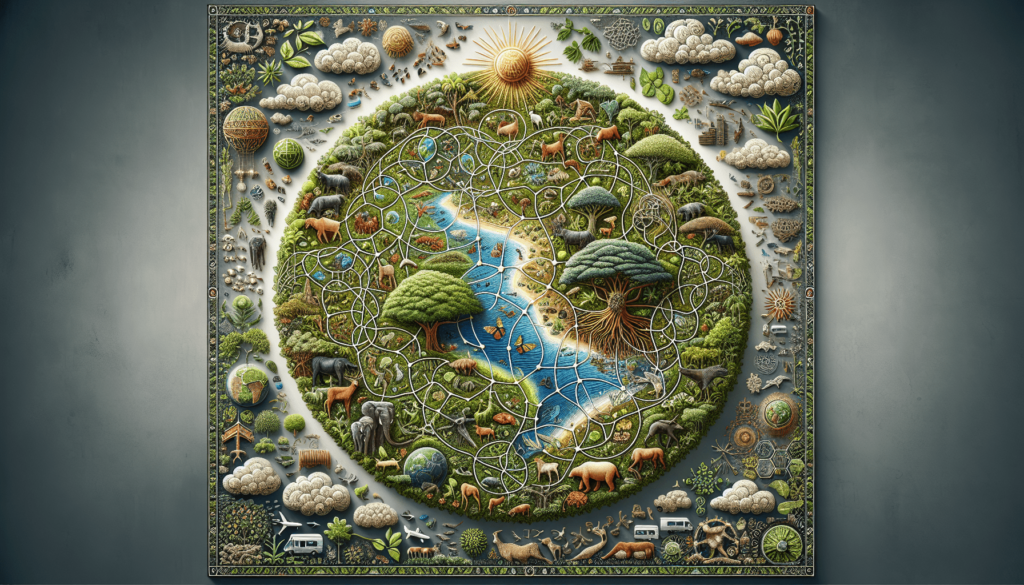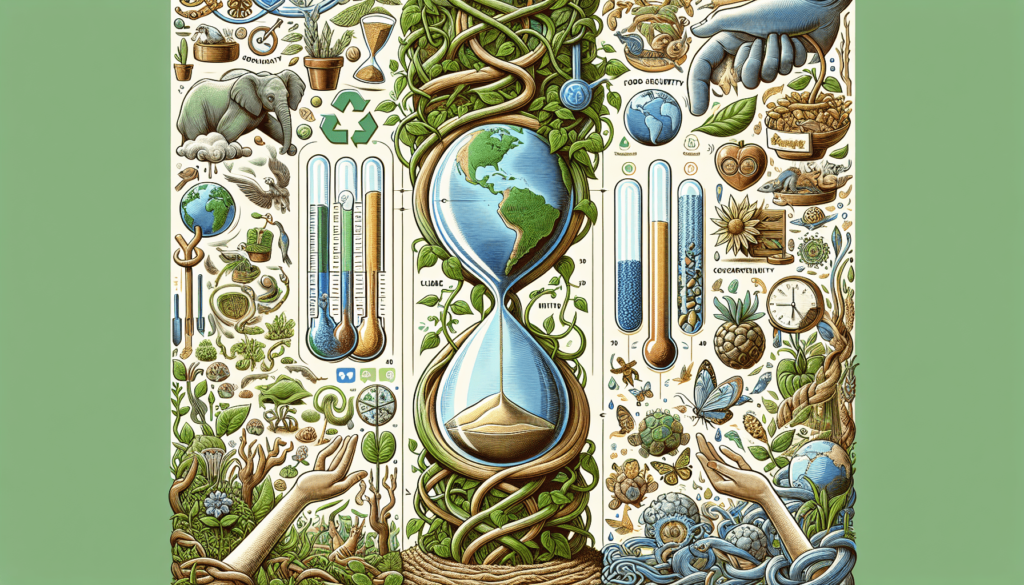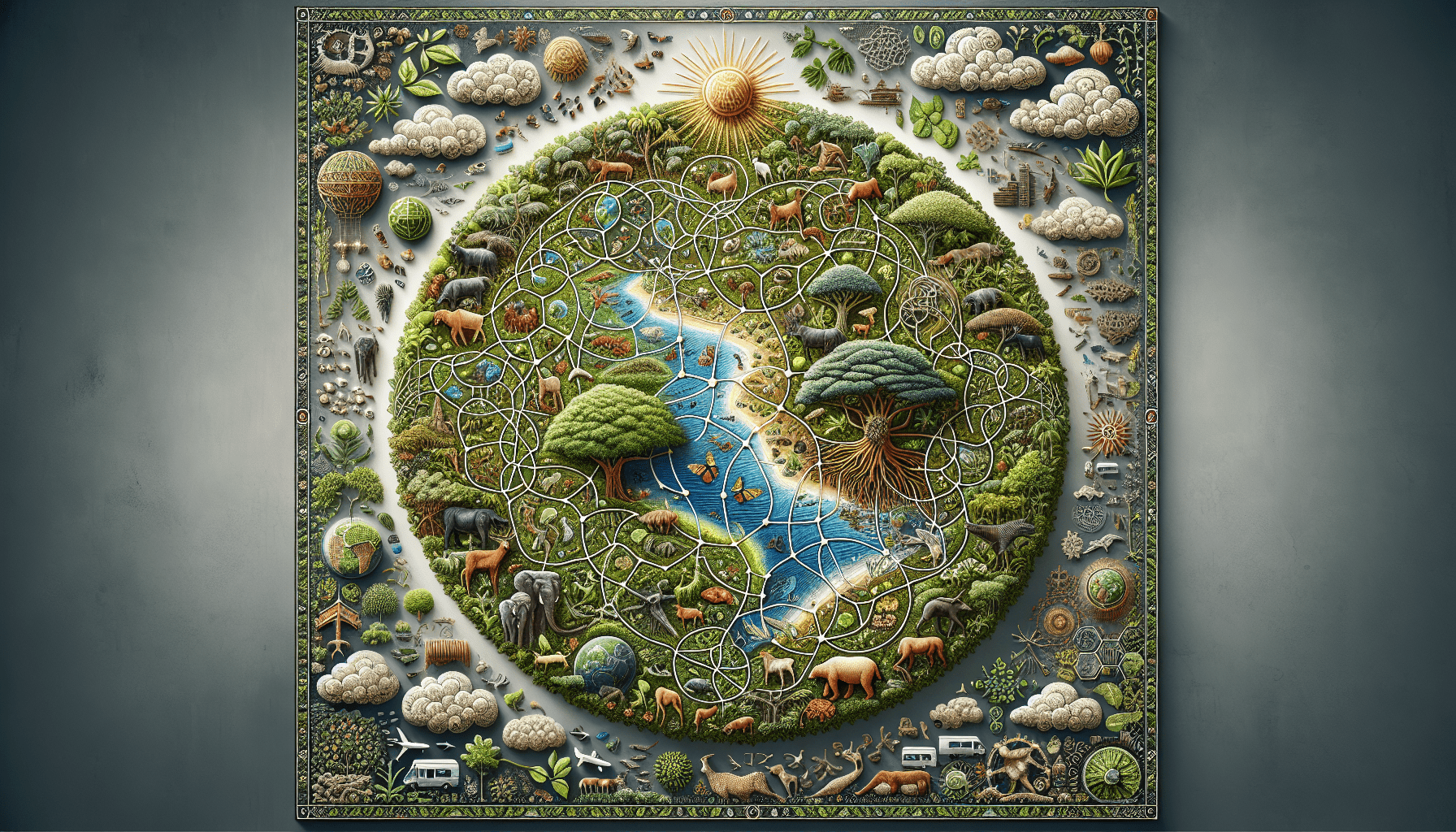Imagine a world where incredible species like the giant panda or the blue whale no longer exist, where the harmonious balance of ecosystems is disrupted, and where the beauty and wonder of nature are diminished. This is the reality we face if we do not recognize and uphold the vital importance of conserving biodiversity. From providing essential ecosystem services to promoting human well-being, biodiversity is the ultimate foundation of our planet’s health. In this article, we will explore why conserving biodiversity is crucial and how our actions can make a positive impact on the preservation of life on Earth.
Ecological Balance
Maintaining a Healthy Ecosystem Ecological balance is vital for the health and stability of ecosystems. It refers to the intricate web of relationships between different species, their habitats, and their interactions. By conserving biodiversity, we can ensure that these relationships are preserved, allowing for a healthy and thriving ecosystem.
Interdependence of Species One of the key reasons why conserving biodiversity is crucial is the interdependence of species within an ecosystem. Each organism plays a unique role in maintaining the balance of the ecosystem. From pollinators like bees and butterflies to decomposers like fungi and bacteria, every species has its place. When one species is lost, it can disrupt the delicate balance and have a cascading effect on other organisms.
Stability of Food Webs A diverse range of species is necessary for the stability of food webs. Food webs consist of interconnected chains of predator-prey relationships, with energy flowing through different trophic levels. By conserving biodiversity, we ensure that all the links in the food web remain intact. Each species, no matter how small or seemingly insignificant, plays a crucial role in maintaining the balance of energy flow and nutrient cycling.
Medical Advancements
Potential for New Drugs Conserving biodiversity is essential for the development of new drugs and medicines. Many of our current pharmaceuticals have their roots in natural compounds derived from plants, animals, and microorganisms. By protecting different species and their habitats, we not only preserve potential sources of life-saving drugs but also create opportunities for future medical breakthroughs.
Traditional Medicine Traditional medicine, practiced by different cultures around the world, relies heavily on the knowledge and use of natural resources. Many traditional remedies and treatments are derived from plants and other organisms found in specific habitats. Conserving biodiversity ensures that such valuable knowledge is preserved and that communities can continue to benefit from traditional healing practices.
Genetic Resources for Research Conserving biodiversity also provides scientists with a vast array of genetic resources for research purposes. Organisms possess unique genetic information that can be studied and utilized for various applications, including the development of new technologies and advancements in fields like agriculture and biotechnology. By protecting species, we safeguard their genetic diversity, allowing for future scientific discoveries and innovations.

Economic Benefits
Tourism and Recreation Conserving biodiversity can have significant economic benefits, particularly in the tourism and recreation sectors. Many natural habitats, such as national parks and wildlife reserves, attract tourists from around the world. Visitors are drawn to the opportunity of experiencing the beauty and diversity of these ecosystems, providing local communities with employment and income opportunities.
Agriculture and Forestry Biodiversity conservation is crucial for the agricultural and forestry sectors. A diverse range of plant and animal species provides essential ecosystem services, such as pollination, pest control, and soil fertility. Sustainable farming practices that support biodiversity can enhance crop yields, reduce the need for chemical inputs, and promote greater resilience against pests and diseases. Similarly, conserving forests ensures the provision of timber resources, clean water, and habitat for countless species.
Bioprospecting and Commercialization Conserving biodiversity opens up avenues for bioprospecting and the commercialization of natural resources. Many industries rely on the extraction and utilization of biological materials, such as pharmaceuticals, cosmetics, and dietary supplements. By preserving biodiversity, we can responsibly explore and utilize these resources, ensuring long-term economic benefits while minimizing negative impacts on ecosystems.
Climate Regulation
Carbon Sequestration Biodiverse ecosystems play a crucial role in carbon sequestration, aiding in the mitigation of climate change. Forests, wetlands, and other natural habitats absorb carbon dioxide from the atmosphere and store it in the form of biomass. By preserving and restoring these ecosystems, we can enhance their capacity to sequester carbon, thus reducing greenhouse gas emissions and helping to combat global warming.
Water Cycle Regulation Conserving biodiversity is closely linked to the regulation of the water cycle. Dense vegetation, such as forests, helps in the retention and filtration of water, reducing the risk of floods and erosion. Moreover, ecosystems like wetlands act as natural water purifiers, removing pollutants and improving water quality. By protecting these habitats, we can ensure a reliable supply of clean water for both human and ecological needs.
Mitigating Climate Change Effects Biodiversity conservation can help mitigate the effects of climate change. Diverse ecosystems are more resilient and adaptable to changing environmental conditions. For example, mangrove forests act as natural buffers against flooding and storm surges, protecting coastal communities from the impacts of climate-related disasters. By safeguarding biodiversity, we enhance the ability of ecosystems to withstand and recover from climate change-induced disturbances.

Pollination and Seed Dispersal
Maintaining Plant Reproduction Biodiversity conservation is vital for the pollination of flowering plants. Pollinators, such as bees, butterflies, birds, and bats, facilitate the transfer of pollen between plants, enabling them to reproduce. This process ensures the continuity of plant populations and the production of fruits, seeds, and other essential resources for both humans and wildlife. Without pollinators, many plant species would decline, leading to a loss of food sources and ecosystem functioning.
Crop Production Pollinators also play a crucial role in agriculture by facilitating crop production. Many agricultural crops, including fruits, vegetables, and nuts, depend on insect and animal pollination for optimal yield. By conserving biodiversity and protecting pollinators, we can enhance agricultural productivity and food security, benefiting both farmers and consumers.
Natural Restoration of Ecosystems In addition to pollination, biodiversity conservation is essential for the natural restoration of ecosystems. Various species, including birds and mammals, contribute to seed dispersal, carrying seeds to new locations and aiding in the regrowth of habitats. This process is particularly important in areas that have experienced disturbances, such as wildfires or deforestation. By preserving biodiversity, we help ecosystems recover and restore their ecological functions.
Cultural and Aesthetic Value
Preserving Cultural Heritage Biodiversity is deeply intertwined with cultural heritage. Different cultures across the world have developed unique relationships with their natural surroundings, shaping their traditions, beliefs, and way of life. Conserving biodiversity ensures that these cultural connections are preserved for future generations, allowing communities to maintain their traditional practices and protect their cultural heritage.
Connection to Nature The aesthetic value of biodiversity cannot be understated. Natural environments, from lush rainforests to coral reefs, provide awe-inspiring beauty and tranquility. Connecting with nature has been shown to have numerous physical and mental health benefits, promoting well-being and reducing stress. By conserving biodiversity, we ensure that people have the opportunity to experience and appreciate the wonders of the natural world.
Ethical Considerations Conserving biodiversity is not just a matter of practicality; it is also an ethical responsibility. Every species has its intrinsic worth and the right to exist. As humans, we have a moral responsibility to protect and conserve the diversity of life on Earth. By recognizing the intrinsic value of biodiversity and acting accordingly, we demonstrate our commitment to the well-being of all living organisms and the sustainability of the planet.
Resilience to Environmental Changes
Adaptation and Evolution Conserving biodiversity is crucial for the adaptation and evolution of species. As environments change, different organisms must adapt to new conditions to survive and reproduce. The wide range of genetic diversity found in biodiversity provides the raw material for adaptation and evolution. By protecting different species, we ensure their ability to respond to environmental changes and maintain the long-term stability of ecosystems.
Buffering Against Disasters Biodiverse ecosystems act as natural buffers against environmental disasters. For example, coastal mangroves serve as protective barriers, reducing the impacts of storm surges and safeguarding coastal communities. Similarly, healthy forests have the capacity to mitigate the effects of landslides and floods. By conserving biodiversity, we enhance the resilience of ecosystems, reducing the vulnerability of both human and natural systems to extreme events.
Enhancing Ecosystem Stability Biodiversity is closely linked to the stability of ecosystems. A rich variety of species ensures that essential ecological processes, such as nutrient cycling and energy flow, continue uninterrupted. Each species fulfills specific roles and contributes to the overall functioning and resilience of the ecosystem. By conserving biodiversity, we help maintain this stability, ensuring the provision of ecosystem services and the sustainability of natural systems.
Intrinsic Worth
Every Species is Unique One of the fundamental reasons to conserve biodiversity is the recognition of the uniqueness and inherent value of each species. Every organism, no matter how small or seemingly insignificant, has its role and place in the tapestry of life. Each species has its own evolutionary history, adaptations, and contribution to the diversity of life on Earth. By conserving biodiversity, we protect and celebrate the intrinsic worth and beauty of every living creature.
Right to Exist Just as humans have the right to exist and thrive, so do all other species. Biodiversity conservation acknowledges and respects the right of non-human organisms to live and flourish in their natural habitats. It recognizes the interconnectedness of ecosystems and the importance of maintaining the integrity of these systems for the well-being of all species. By safeguarding biodiversity, we ensure that future generations can appreciate and benefit from the incredible diversity of life.
Moral Responsibility Preserving biodiversity is not only a matter of personal choice but a moral responsibility. As stewards of the planet, we are entrusted with the task of caring for and protecting the natural world. By acknowledging our moral responsibility, we commit ourselves to conserve biodiversity for its intrinsic value and for the generations to come. Choosing to protect and preserve biodiversity is an ethical imperative that reflects our shared commitment to a sustainable and thriving future.
Educational and Scientific Purposes
Study of Nature and Evolution Biodiversity conservation is essential for the study of nature and the understanding of evolutionary processes. By documenting and researching different species and their interactions, scientists gain valuable insights into the workings of the natural world. The study of biodiversity contributes to our understanding of evolution, ecology, and the complex relationships between organisms. Protecting biodiversity ensures that these realms of scientific knowledge continue to expand and inform our understanding of the world around us.
Understanding Ecosystem Dynamics Conserving biodiversity provides a unique opportunity to study and understand ecosystem dynamics. By observing the interactions between species and the functioning of ecosystems, scientists can gain valuable knowledge about ecological processes. This understanding allows us to make informed decisions and develop sustainable management practices that protect and enhance the health of ecosystems. By conserving biodiversity, we foster scientific research and create opportunities for new discoveries and insights.
Inspiring Future Generations The conservation of biodiversity serves as a source of inspiration and education for future generations. By exposing young minds to the wonders of the natural world, we instill a sense of wonder, curiosity, and appreciation for the diversity of life. Understanding the importance of biodiversity early on can lead to a lifelong commitment to conservation and sustainable practices. By nurturing a love for nature, we empower future generations to become responsible stewards of the environment and advocates for the preservation of biodiversity.
Conservation of Endangered Species
Preventing Extinction Perhaps one of the most urgent reasons to conserve biodiversity is to prevent the extinction of endangered species. Human activities, such as habitat destruction, pollution, and climate change, have pushed many species to the brink of extinction. By protecting and restoring their habitats, implementing effective conservation strategies, and preventing illegal wildlife trade, we can give endangered species a fighting chance at survival. Each species holds valuable genetic information and contributes to the overall biodiversity of the planet.
Preserving Genetic Diversity Conserving biodiversity ensures the preservation of genetic diversity within and between species. Genetic diversity provides organisms with the capacity to adapt to changing conditions, reducing their vulnerability to threats such as diseases and climate change. By safeguarding endangered species, we protect unique genetic resources that have the potential to contribute to scientific advancements and the resilience of ecosystems. Preserving genetic diversity is crucial for the long-term sustainability of life on Earth.
Preventing Ecosystem Disruptions The loss of even a single species can have profound impacts on the functioning and stability of ecosystems. Endangered species often play critical roles in their respective habitats, such as acting as keystone species or providing essential ecosystem services. When these species are lost, the delicate balance within ecosystems is disrupted, leading to cascading effects on other species and ecological processes. By conserving endangered species, we ensure the preservation of ecosystem integrity and the sustainability of ecological interactions.

